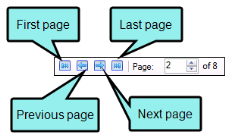Viewing Used Language Tags
You can view a list showing each file where a language tag is found, the content tag to which it has been applied (e.g., html, span), and the language used.
- Open a project.
-
Select the View ribbon. In the Dynamic Reports section, select Used Items > Used Language Tags.
The Used Language Tags window pane opens, listing all of the language tags used throughout the project.
- To see more of the information in the window pane, drag the divider bar to make the pane wider:
- Language Displays the abbreviation for the language in the tag. For example, the abbreviation for English is "en"; the abbreviation for German is "de"; and the abbreviation for Italian is "it."
- Tag Displays the tag for the content where the language tag is applied. For example, if the language is applied to a topic file, the tag is html. If the language is applied to selected text within a paragraph, the tag is span.
- File Displays the name of the file.
- Title Displays the properties title of the file (if any).
- Folder Displays the folder where the file is found.
-
If a certain number of items have been found, page navigation buttons in the local toolbar may be enabled. You can use these buttons to go to additional pages to display more items. You also have the option to view all items at once in one long list. This is called the View All option. You can toggle these views by clicking the View All/View as Pages button in the local toolbar. The button displays the opposite of whatever view is currently activated (e.g., If the View All option is currently active, the button shows View as Pages to indicate that if clicked, the button will switch the window pane to the View as Pages option).
-
You can open any file in the list to view or modify it in an editor. You can open the file in the Analyzer interface or in the Flare project.
to open the file in the analyzer interface
Double-click the file in the window pane. The benefit of using this method is that it is quick and convenient. You have access to the features normally available in the editor (but not necessarily to all of the features available elsewhere in Flare).
to open the file in flare
- In the window pane, click on the file.
- Select File > Send to Flare.
The benefit of using this method is that you have access to all of the features in the application, not just those available from the editor.
Note: You can also include this information in reports that you create.
